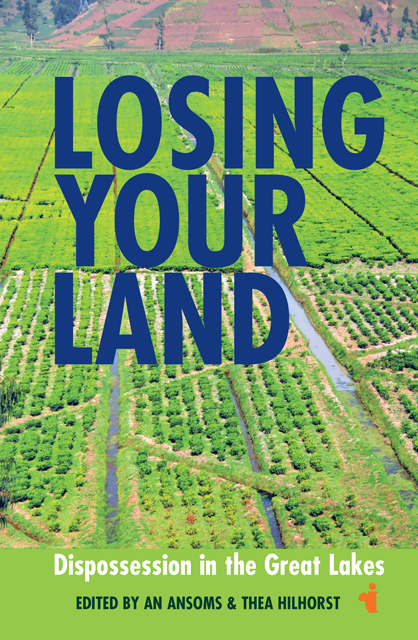Book contents
- Frontmatter
- Contents
- List of Illustrations
- Notes on Contributors
- Acknowledgements
- List of Abbreviations & Acronyms
- 1 Introduction: Causes & Risks of Dispossession & Land Grabbing in the Great Lakes Region
- 2 Land Grabbing & Development History: The Congolese Experience
- 3 This Land is My Land: Land Grabbing in Ituri (DRC)
- 4 Land Grabbing by Mining Companies: Local Contentions & State Reconfiguration in South Kivu (DRC)
- 5 Competition over Soil & Subsoil: Land Grabbing by Local Elites in South Kivu (DRC)
- 6 The Continuities in Contested Land Acquisitions in Uganda
- 7 Land Grabbing & Power Relations in Burundi: Practical Norms & Real Governance
- 8 Land Grabbing & Land Tenure Security in Post-Genocide Rwanda
- 9 The Reorganization of Rural Space in Rwanda: Habitat Concentration, Land Consolidation & Collective Marshland Cultivation
- 10 ‘Modernizing Kigali’: The Struggle for Space in the Rwandan Urban Context
- Conclusion
- Index
1 - Introduction: Causes & Risks of Dispossession & Land Grabbing in the Great Lakes Region
Published online by Cambridge University Press: 24 February 2023
- Frontmatter
- Contents
- List of Illustrations
- Notes on Contributors
- Acknowledgements
- List of Abbreviations & Acronyms
- 1 Introduction: Causes & Risks of Dispossession & Land Grabbing in the Great Lakes Region
- 2 Land Grabbing & Development History: The Congolese Experience
- 3 This Land is My Land: Land Grabbing in Ituri (DRC)
- 4 Land Grabbing by Mining Companies: Local Contentions & State Reconfiguration in South Kivu (DRC)
- 5 Competition over Soil & Subsoil: Land Grabbing by Local Elites in South Kivu (DRC)
- 6 The Continuities in Contested Land Acquisitions in Uganda
- 7 Land Grabbing & Power Relations in Burundi: Practical Norms & Real Governance
- 8 Land Grabbing & Land Tenure Security in Post-Genocide Rwanda
- 9 The Reorganization of Rural Space in Rwanda: Habitat Concentration, Land Consolidation & Collective Marshland Cultivation
- 10 ‘Modernizing Kigali’: The Struggle for Space in the Rwandan Urban Context
- Conclusion
- Index
Summary
Contemporary contestations in the land arena in Africa’s Great Lakes Region are often embedded in long-term historical trajectories in which struggles over land are closely associated with strife and violence. Indeed, the region has for decades been torn by local and regional conflict, war and instability. Today’s peace in central Africa is brittle and further conflict never seems far away. Yet however fragile the current situation, new and old underexploited opportunities appear to rebound to the surface, including within the land arena.
In fact, the struggles over land taking place today in the Great Lakes Region tie in with a broader trend of growing competition over land across Africa. In a context of globalization and liberalization, the continent is experiencing a rush to commercialize its natural resources. Land, over the past decade or so, has increasingly become a commodity and a source of fierce competition between internal and external forces. Since 2000, the rate of land transfers has been picking up speed, from the highest national to the lowest local level. These transfers are not always voluntary or transparent. They commonly take place without the consent of local actors or their full understanding of what the transfer implies in terms of present and future land rights. In many cases, local farmers’ interests are not (fully) taken into account or even bluntly ignored. To many individuals, loss of land implies a loss of livelihood, particularly given their lack of access to income-generating alternatives. Moreover, land is not just an economic asset; it is also a social, cultural and political space with great relevance to the social, psychological and emotional wellbeing of local populations. Hence the consequences of losing one’s land rights extend beyond the economic realm: the rush for land may also be framed in terms of ‘soul and identity grabbing’.
Non-transparent and non-voluntary land transactions are increasingly referred to as ‘land grabbing’, a term now also widely used by NGOs, policymakers and academics. As a notion, it is firmly in the global spotlight. However, ‘land grabbing’ is a value-loaded term and its definition is not straightforward. What makes a land transaction an instance of land grabbing?
- Type
- Chapter
- Information
- Losing your LandDispossession in the Great Lakes, pp. 1 - 10Publisher: Boydell & BrewerPrint publication year: 2014
- 1
- Cited by

